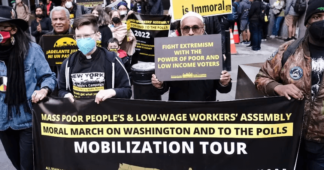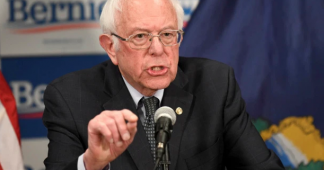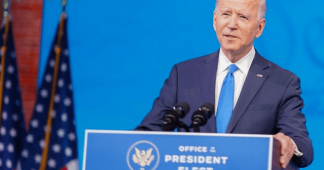“Why don’t poor people get meetings in the Oval Office instead of corporations?”
By Kenny Stancil
Low-wage workers, union presidents, and progressive faith leaders on Monday urged President Joe Biden to meet with a handful of the millions of Americans living in poverty before the Poor People’s Campaign rallies in Washington, D.C. on June 18 to demand an economy and democracy that works for everyone, not just the wealthy few.
At the upcoming Mass Poor People’s and Low-Wage Workers’ Assembly and March on Washington and to the Polls, activists from around the United States plan to highlight “the urgent need to prioritize the 140 million poor and low-income people in our laws, policies, systems, and structures, so that we may heal this nation from the interlocking injustices of systemic racism, poverty, ecological devastation, the denial of healthcare, militarism, and the war economy, and the false narrative of Christian nationalism.”
That’s how Bishop William J. Barber II and Rev. Dr. Liz Theoharis, co-chairs of the Poor People’s Campaign: A National Call for Moral Revival, recently put it in a letter asking Biden to listen to a delegation of poor and low-income people explain why prioritizing their interests is key to improving the nation’s economic well-being.
Amid reports that Biden plans to hit the road in the coming weeks to tout steps that his struggling administration is taking to address cascading challenges, economic justice advocates on Monday reiterated the campaign’s call for the president to hear directly from some of the low-wage workers from around the country who are preparing to demonstrate in D.C. in less than two weeks.
Speaking from the nation’s capital, Barber lamented how “corporations are treated like people and people are treated like things.”
“Why don’t poor people get meetings in the Oval Office instead of corporations?” he asked.
Morgan Leavy, a barista and member of Starbucks Workers United, exemplifies the kind of person the campaign wants Biden to sit down with.
Leavy—whose Starbucks location became the first in Texas where employees voted to unionize, one of more than 100 victories nationwide since December—said that “Starbucks workers should not be poor people,” underscoring how the company’s record-breaking profits stem from the exploitation of hundreds of thousands of poorly paid workers like her.
David Williams, a low-wage worker at Dollar General and member of Step Up Louisiana, made similar points. So did Beth Schaffer, a low-wage worker and supporter of Fight for $15 in South Carolina. Even after working 62 hours per week at KFC and a gas station, Schaffer still struggles to pay rent and take care of her elderly father because her wages are so low.
The federal hourly wage floor of $7.25, which hasn’t been increased by Congress since 2009, is “sentencing us to poverty,” said Schaffer. “A lot of people work full-time and still end up homeless in this country.”
Plan now: this June 18th in DC, ahead of this year's midterm elections, join The Mass Poor People’s & Low-Wage Workers’ Assembly & Moral March on Washington and to the Polls. https://t.co/hOc13dZslH pic.twitter.com/Dt7hpFphbT
— SEIU (@SEIU) June 4, 2022
In a statement released ahead of Monday’s press conference, Barber noted that “our nation is experiencing a historic wave of labor uprisings led by the workers who are demanding that the value of their work be represented in their pay, their working conditions, and in our nation’s laws.”
“The widespread worker-led actions we are witnessing in America today are alarm bells that should force the nation to pay attention to the economic emergency that includes everything from the lack of a federally mandated living wage to the devastating impact of Covid on poor and low-wealth communities,” said Barber.
“It is time for the president to act on his pre-election promise to address poverty,” he added. “More jobs alone, with a $7.25 per hour federal minimum wage, equal more poverty. This is why labor unions are joining our call to the president to use his power to lift the voices of impacted people and to act now.”
Dozens of unions representing millions of working people—including the AFL-CIO; American Federation of Teachers; American Federation of State, County, and Municipal Employees; American Postal Workers Union; Association of Flight Attendants; Communications Workers of America; National Education Association, Service Employees International Union; UNITE HERE; United Steelworkers; United Food and Commercial Workers Union; and United Electrical, Radio, and Machine Workers of America—recently released a video endorsing the upcoming assembly and march.
“Working people are fed up and fired up, and in workplaces across the country, we are saying enough is enough,” AFL-CIO president Liz Shuler said in a statement. “We are tired of the rich getting richer while breaking the rules as working families just struggle to get by… We will join together in D.C. to call for an end to poverty.”
SEIU president Mary Kay Henry, AFSCME president Lee Saunders, and Keturah Johnson, international vice president of AFA-CWA, echoed that message on Monday.
Theoharis, for her part, pointed out that the refusal of right-wing Democratic Sen. Joe Manchin (W.Va.) and Senate Republicans to extend the expanded Child Tax Credit—which has coincided with Congress’ approval of billions of dollars in weapons shipments to Ukraine—has worsened hunger for millions of U.S. families.
“War and militarism remain enemies of the poor,” she said, “both here in the United States and across the world.”
Barber, meanwhile, added that “the nation cannot ultimately expect any kind of economic stability as long as you have a constituency of over 140 million people living at the bottom—struggling at the bottom.”
We remind our readers that publication of articles on our site does not mean that we agree with what is written. Our policy is to publish anything which we consider of interest, so as to assist our readers in forming their opinions. Sometimes we even publish articles with which we totally disagree, since we believe it is important for our readers to be informed on as wide a spectrum of views as possible.










